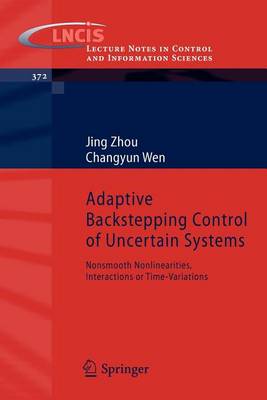This book presents new methodologies for the design and analysis of adaptive control systems based on the backstepping approach. Our emphasis is on - namic uncertain systems with nonsmooth nonlinearities,such as backlash,de- zone, hysteresis and saturation, or time-varying parameters, or interactions. The backstepping approach, a recursive Lyapunov-based scheme, was p- posed in the beginning of 1990s. With this method the construction of feedback controllawsandLyapunovfunctions issystematic,followingastep-by-stepal- rithm. Backstepping can be used to relax the matching condition, which blocked the traditional Lyapunov-based design. A major advantage of backstepping is that it has the ?exibility to avoid cancellations of useful nonlinearities and achieve regulation and tracking properties. The technique was comprehensively addressed by Krstic, Kanellakopoulos and Kokotovic in [1]. However, there is still no monograph available to address problems such as the handling of n- smooth nonlinearities, time varying parameters and system interactions using this approach.
Nonsmooth nonlinearities such as dead-zone, backlash, hysteresis and satu- tion are common in industrial control systems, such as mechanical, hydraulic, biomedical, piezoelectric, and physical systems. Such nonlinearities are usually poorlyknownandmayvarywithtime,andthey oftenlimitsystemperformance.
- ISBN10 3540847308
- ISBN13 9783540847304
- Publish Date 15 February 2009 (first published 7 February 2008)
- Publish Status Withdrawn
- Out of Print 18 October 2014
- Publish Country US
- Imprint Springer
- Format Paperback (US Trade)
- Pages 264
- Language English
